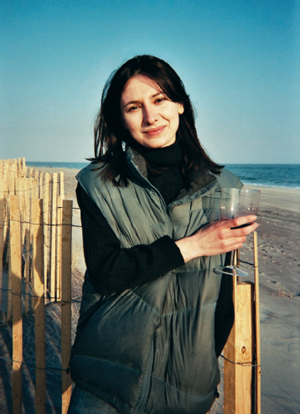Eastern bloc expat earns literary laurels
Eastern bloc expat earns literary laurels
The title of Sana Krasikov's collection of short stories, One More Year, is taken from a line spoken by one of her characters, a teenage boy in Tbilisi awaiting his mother's return from New York, where she works to support him. "'Every year you say, 'It's one more year, it's one more year'!" he accuses her. For Krasikov '01—who has been collecting accolades since Spiegel & Grau published her book in 2008—the argument was one she heard frequently as a former resident of the Republic of Georgia growing up in the U.S. "My home became a kind of halfway station for people who were forced to venture out on their own, usually from places that had collapsed economically," says Krasikov, who relocated at age nine. "I wrote about people who came from a world that now exists more in their imagination than anywhere else."

Krasikov has translated those experiences into a forceful literary debut: One More Year garnered the prestigious $100,000 Sammy Rohr Prize for Jewish Literature in 2009. The win was the culmination of one very good year for the first-time author. Krasikov—whose early essays were published in the New Yorker and the Atlantic Monthly—landed on the short list for the New York Public Library Young Lions Fiction Award and was featured on a New Yorker Festival panel of expatriate authors. While One More Year is set in a world of cultural transitions, it is the human interactions that take center stage. Says Publisher's Weekly: "Krasikov's prose is precise, and her stories are intelligent, complex, and passionate."
While each story in the collection has its own cast of characters, they all live in a similar limbo between America and Eastern Europe. Krasikov explores the push and pull of their homelands, describing a Polish girl who marries for U.S. residency, while a few pages later a Wall Street analyst rejects American life to return to his native Moscow, much to his wife's dismay. These experiences are peppered with hardships—the young husband turns abusive, an older man mourns his long-dead lover—but Krasikov avoids both pathos and hero worship. "The stories don't always have the big redemptive note at the end," she says, "but I do think there are small victories for the characters." Her tales often conclude with acts of self-assertion: a carefully cooked omelet serves as a reminder of one woman's ability to take care of herself. "The women in the stories are in no way victims," notes Krasikov, who spent a year in Moscow on a Fulbright fellowship. "Their circumstances may be challenging, but they have spines of steel. I know women like that, and I think there's something really compelling about them."
'I think you have to be at least a little delusional to be a writer,' says Krasikov. 'So I guess I'm delusional.'Though Krasikov's move from cultural observer to author may seem natural, had it not been for Cornell's course enrollment hierarchy, she might never have become a fiction writer. "I started off as a chemistry major, and I spent my entire first year in labs," says Krasikov. "I also loved art, but the priority for those courses would go to art majors, and I kept getting kicked out. I think eventually that desire ended up getting sublimated into writing."
Krasikov, who covered the Ithaca city beat for the Daily Sun and interned at Cornell Alumni Magazine, was reluctant to consider herself a fiction writer until the editors of the literary magazines who received her non-fiction essays made the assumption for her, publishing them as short stories. Looking back on her time in journalism, though, the transition makes sense. "You got to be a tourist in all these different worlds—and even then, I would take longer than any other reporter," she recalls. "I would craft stories so carefully, you couldn't move a single line out of place." As a reporter in New Hampshire after graduation, the inability to spend that kind of time polishing her prose pushed her further into experimenting with fiction; she earned an MFA from the Iowa Writer's Workshop in 2005.
Despite the raves for One More Year, Krasikov—who will speak on campus in November as part of the Creative Writing Program author series—remains self-effacing. "I think you have to be at least a little delusional to be a writer," she says, "so I guess I'm delusional." Although she hints that she's working on a longer project, she won't reveal anything beyond the historical setting: Depression-era Brooklyn. And she admits that the American response to her stories differs from that of foreign audiences. "Russians would never call these stories depressing," says Krasikov. "They find them funny."
— Liz Sheldon '09


